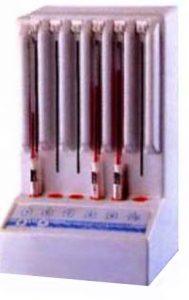Why Is My Dog Or Cat’s Erythrocyte Sedimentation Rate ESR Increased?
(ESR measures the rate at which blood sediments or falls to the bottom of the tubes)
Ron Hines DVM PhD
Your Pet’s Erythrocyte Sedimentation Rate = ESR or Sed Rate
See a slightly different explanation here.
The erythrocyte sedimentation rate or ESR is a very basic test whose results respond to inflammation anywhere in your pet’s body. The test measures the speed with which your pet’s red blood cells (erythrocytes=RBCs) drop to the bottom of a glass tube during a period of one hour.
This very old test, is rapidly being replaced by more sophisticated ones that directly measure the amount of inflammatory agents (e.g. C-reactive protein, fibrinogen and aPTT, all acute phase reactant produced by your pet’s liver) that rise in all sorts of inflammatory situations.
Although the ESR tells veterinarians that inflammation is present, it does not tell us where the inflammation is happening or the type. Certain blood constituents (mainly fibrinogen) speed the rate at which the blood settles (sediments) under gravity while others (the negative charge of erythrocytes) delay it.
Reason’s Why Your Dog or Cat’s Erythrocyte Sedimentation Rate Might Be Faster (Higher Than Normal):
Any cause of generalized inflammation. That could be an infection, the inflammation of moderate to severe arthritis, autoimmune disease, parasite infections, cancer or kidney disease.
Even anemia itself increases ESR. So pets with a lower than normal number of red blood cells often have faster sedimentation rates.
Reason’s Why Your Dog And Cat’s Erythrocyte Sedimentation Rate Might Be Slower (Lower Than Normal):
Diseases that alter the shape of your pet’s erythrocytes can extend (prolong) ESR rate test results. So can very high white blood cell (WBC) counts, disseminated intravascular coagulation (DIC), congestive heart failure or elevated blood bile salt levels.
DxMe
You are on the Vetspace animal health website
